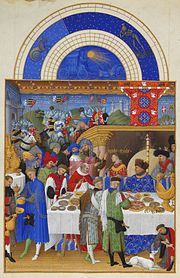January
From Wikipedia, the free encyclopedia.
| January | ||||||
| Su | Mo | Tu | We | Th | Fr | Sa |
| 1 | ||||||
| 2 | 3 | 4 | 5 | 6 | 7 | 8 |
| 9 | 10 | 11 | 12 | 13 | 14 | 15 |
| 16 | 17 | 18 | 19 | 20 | 21 | 22 |
| 23 | 24 | 25 | 26 | 27 | 28 | 29 |
| 30 | 31 | |||||
| 2005 | ||||||
January is the first month of the year in the Gregorian Calendar and one of seven Gregorian months with the length of 31 days.
January begins (astrologically) with the sun in the sign of Capricorn and ends in the sign of Aquarius. Astronomically speaking, the sun begins in the constellation of Sagittarius and ends in the constellation of Capricornus.
January is named for Janus, the Roman god of doors and gateways.
The original Roman calendar consisted of 10 months (304 days). The Romans originally considered winter a monthless period. Circa 700 BCE Romulus' successor, King Numa Pompilius, added the months of January and February allowing the calendar to equal a standard lunar year (364 days). A Roman superstition against even numbers resulted in the addition of one day thus equaling 365 days. Although March was originally the first month, January usurped that position because that was when consuls were usually chosen.
The first day of the month is known as New Year's Day.
Historical names for January include its original Roman designation, Ianuarius, the Saxon term Wulf-monath (meaning wolf month) and Charlemagne's designation Wintarmanoth (winter / cold month). In old Japanese calendar, the month is called Mutsuki (睦月). The second day of the month is known as Hatsuyume (初夢) and the 7th day as Nanakusa (七草). In Finnish, the month is called tammikuu, meaning "month of the oak".
The first Monday in January is known as Handsel Monday in Scotland and northern England. In England, the agricultural year began with Plough Sunday on the Sunday after Epiphany.
The Coming of age day in Japan is the second Monday of January, for those becoming 20 years old in the new calendar year. It is a national holiday. The day has existed since 1948, but fell on January 15 until 1999, when it was moved by the Japanese government in an attempt to lift the economy by making more holidays consecutive.
In the pagan wheel of the year, January ends at or near to Imbolc in the northern hemisphere and Lughnasadh in the southern hemisphere.
See also
| January | February | March | April | May | June | July | August | September | October | November | December |
Categories: Days | Months


